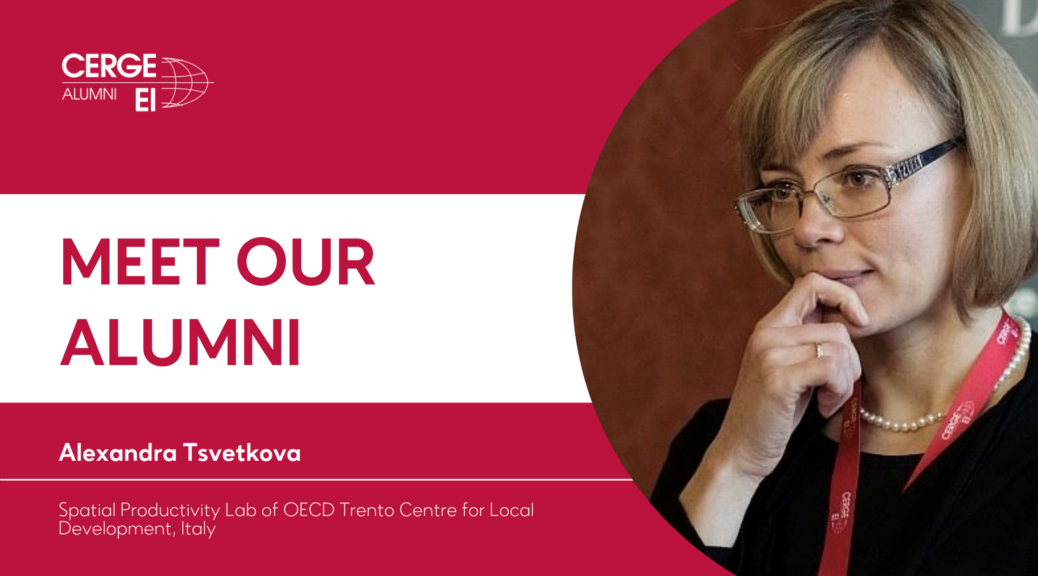Alexandra Tsvetkova, a 2005 MA graduate, works as a coordinator at the Spatial Productivity Lab of OECD Trento Centre for Local Development in Italy. What does she like about her work and why is she active in alumni community? Read more in our latest alumni interview.
You came to CERGE-EI after you finished your Master’s degree in Political Science at Central European University. Why did you decide to apply to CERGE-EI and study economics?
Frankly, the decision was mostly motivated by my personal circumstances – I needed a drastic change in my life and going back to grad school and tackling something I never did before in a foreign country felt like the right challenge. I heard about CERGE-EI from a fellow student during my studies at Central European University and decided to give it a try. The beauty of Prague drew me in.
After your MA at CERGE-EI, you pursued your PhD in Public Policy at the University of North Carolina-Charlotte. Did your CERGE-EI experience prepare you well enough for studies in the US?
I would say it prepared me super well for studies in public policy, which is a mix of (a softer) content analysis and (a more rigorous) econometric approach. In fact, I credit my CERGE-EI experience for the “star student” status that I enjoyed during my US studies (I was the only person in my cohort who unconditionally passed qualifying exams).
As for my studies in the US, I found the reality of an urban campus located outside of a city centre in North Carolina massively different from my experience at CERGE-EI and Prague. The student body was also more diverse age-wise, with many fellow students in the middle of their careers, with families, etc. So, the good old tradition of a round of beers with classmates after submitting homework or completing a test was naturally absent from my student life in Charlotte.
Since 2018 you have been leading the Spatial Productivity Lab at OECD Trento Centre for Local Development in Italy. Can you tell us more about your work?
The Spatial Productivity Lab (SPL) is a more research-oriented unit hosted by OECD Trento Centre for Local Development, which is a part of the OECD Centre for Entrepreneurship, SMEs, Regions and Cities (CFE) located in Paris. The lab generates and disseminates knowledge about productivity at a subnational level – from local and regional drivers to spatial effects of productivity. The main goal is to raise awareness about the need to look at productivity through a spatial lense and to inform place-based policies that can boost aggregate productivity growth while reducing interregional inequalities.
SPL contributes to many activities at Trento Centre and CFE, including policy analysis and advice, event organisation, preparation of various written materials, etc. We actively interact with policy makers and researchers in many countries on the topics of productivity and growth – it is indeed a fascinating and unique place that brings research and policy together.
I am very proud that I served as a bridge to bring a couple of current CERGE-EI students as research interns to CFE. Our colleagues are invariably impressed by their quality of work done.
You are an active member of our alumni community. You took part in our Mentoring Program for Women Researchers, and recently you became a contact person for our Alumni Local Group in Italy. What are your motivations to take part in these initiatives?
Obviously to give back but also to give forward. Many people helped me in my professional journey. Often, support came unexpectedly and random encounters played a role. If I can help somebody go a bit farther or carry lighter weight in their journey, this would honor those who helped me and hopefully would set in motion a cycle of support that would perpetuate and expand.
What are your plans with Alumni Local Group in Italy?
As any network, the hope is that it would connect its members to opportunities and will offer support both professionally and personally. We are not too numerous at the moment, so at first I would like to connect and establish some regular-ish interactions, which can grow over time into something more structured and professionally focused.
We plan our first get together this summer. Perhaps we can connect with networks in nearby countries or open our future gatherings to alumni and CERGE-EI students, as Italy is a popular vacation destination.
What do you perceive as the strongest message CERGE-EI gives to its students?
Everything is possible. For decades, CERGE-EI has been opening the door of opportunity for students from all over the world through quality education and scholarships. One can find many alumni in positions of influence across the globe. I am sure that for many of them the CERGE-EI experience paved the way to future success.
